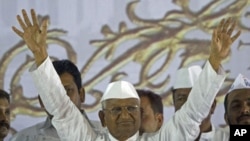In India, anti-corruption campaigner Anna Hazare has ended his hunger strike to press for a tougher anti-graft law earlier than planned. The landmark anti-corruption bill, which he wants redrafted, has been passed by the lower house of parliament and now heads to the upper house, where the government is trying to ensure its passage.
The hunger strike by the anti-corruption campaigner in Mumbai was to last for three days. But on Wednesday evening, the 74-year-old activist announced that he is calling off his protest a day early.
Hazare did not cite a reason. But doctors have warned of a danger to the health of the activist, who has been running a fever. His protest also has seen far thinner crowds compared to his earlier campaigns, prompting commentators to say that the poor public response could be a factor behind his decision.
Hazare also called off a civil disobedience campaign, in which he had asked supporters to fill jails voluntarily starting Friday.
The activist, however, whose fiery campaign in August put the anti-graft bill on the top of the government’s agenda, has vowed to continue his struggle for a tougher law.
The legislation, passed by the lower house on Wednesday, seeks to create a new agency to investigate charges of corruption against politicians and bureaucrats. But civil society activists argue that the proposed ombudsman will not have independent powers of investigation, and will be a tool in the hands of the government.
Hazare said that in upcoming regional elections, he will campaign against all politicians who did not support a tough anti-graft law.
The bill was expected to be debated on Wednesday in the upper house, where it must be passed before it becomes legislation. The government deferred its introduction by a day, though, apparently seeking to gather enough support to push the anti-corruption legislation through.
The ruling coalition is short of a majority in the upper house. It will need the support of regional parties and independent lawmakers to pass the bill because the main opposition Bharatiya Janata Party [BLP] has strongly opposed what it also calls a “flawed law.”
“The UPA government led by Congress [Party] forces a legislation which creates a weak Lokpal,” said Ravi Shankar Prasad, BJP leader.
The government is likely to get a major boost if it can steer the measure through the upper house because it is under pressure to demonstrate its sincerity in fighting corruption after a slew of graft scandals tarnished its image.
India Anti-Corruption Activist Hazare Calls Off Hunger Strike




